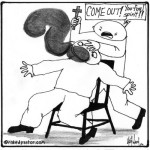We run our website the way we wished the whole internet worked: we provide high quality original content with no ads. We are funded solely by your direct support. Please consider supporting this project.
How do you respond to Isaiah 44:28–45:1?
This passage is one of the most persuasive evidences of divine foreknowledge in the Bible. The verse proclaims the Lord as the one “who says to Cyrus, ‘He is my shepherd, and he shall carry out all my purpose’; and who says of Jerusalem, ‘It shall be rebuilt,’ and of the temple, ‘Your foundation shall be laid.’ Thus says the Lord to his anointed, to Cyrus, whose right hand I have grasped to subdue the nations before him…”
According to the traditional view of the book of Isaiah, Isaiah recorded this prophecy about Cyrus over a hundred years before Cyrus was born. The passage is clear evidence that the Lord foreknew that a king named Cyrus would arise and would be instrumental in rebuilding Jerusalem.
At this time in world history, it fits the Lord’s overall providential plan to return the Israelites to their land. He thus takes unilateral control over a small portion of the immediate future and determines that it shall come about in a certain way. He even predetermines what the name of the king who shall release them shall be, undoubtedly as a sign to the Israelites that he—not the idols they were inclined to chase after—was responsible for setting them free (see 46:9–11; 48:3–5).
This passage is not a “crystal ball” sort of prediction. It is rather a declaration of what the Lord himself is going to accomplish. He is going to “grasp the hand” of Cyrus and direct him. This doesn’t imply that everything about Cyrus was directed by God or that Cyrus was not a free moral agent outside of God’s declared intentions. And it certainly doesn’t imply that everything about the future is foreknown by God. It only implies that whatever God has already decided he’s going to do in the future is known by him before he does it. He foreknows it by knowing his own intentions in the present.
Category: Q&A
Tags: Open Theism, Q&A
Topics: Open Theism, Responding to Objections
Verse: Isaiah 44
Related Reading

Free Will: Is it a coherent concept?
Greg is going to be spending the next several blogs talking about the idea of free will. In this first reflection, he discusses whether it is coherent to speak of a decision that is not determined or exhaustively caused.

What is the significance of Jeremiah 3:6–7?
Regarding Israel, the Lord says “I thought, ‘After she has done all this she will return to me’; but she did not return.” If the future is exhaustively settled in God’s mind, the meaning of this verse is unclear. How could God really think that something was going to happen if he foreknew with absolute…

How do you respond to Acts 2:23?
Peter preaches to the crowd on the day of Pentecost, “[T]his man [Jesus], handed over to you according to the definite plan and foreknowledge of God, you crucified and killed by the hands of those outside the law.” Jesus’ death was certainly planned and foreknown by God, as the previously discussed verses have repeatedly demonstrated.…

How can we determine what is and is not “open” about the future?
Question: You believe that the future is partly open. You’re writing has pretty much convinced me this is true, but I’ve still got some serious questions about it. For example, how does anyone determine what part is open and what part is not? If we can’t determine what is and is not open, isn’t the…

